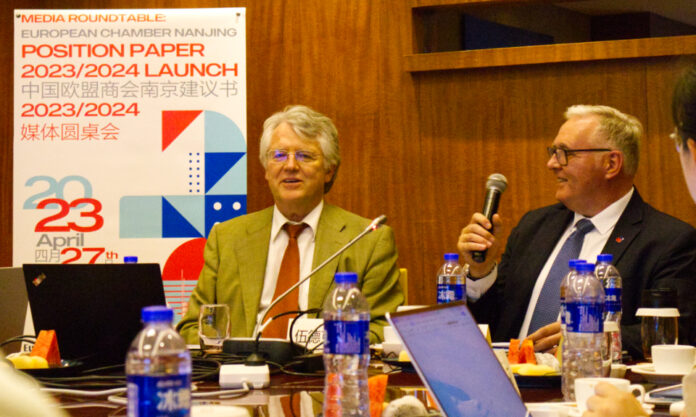Creating a better Nanjing and Jiangsu in terms of levels of internationalism, green energy provision, and Environment, Health and Safety, was the focus today of a major call to the Chinese authorities by the leading chamber of commerce in the region.
The afternoon of today, 27 April, saw the European Chamber of Commerce in China (EUCCC) launch its 2023/2024 Position Paper at a media roundtable event held in Nanjing’s Sofitel Galaxy. Present were media heavyweights from both Nanjing and Jiangsu as a whole, as well as this publication.
The third Nanjing Position Paper focuses on current operational challenges faced by the Chamber’s 120-plus local members based in Nanjing, Xuzhou, Wuxi, Changzhou, Suzhou and Zhenjiang of Jiangsu Province; plus Ma’anshan and Chuzhou of Anhui Province.
Getting to the Paper itself but before delving into the myriad of ways in which our region is lacking from an international standpoint, it is important to also look to the positive and note there have of late already been improvements.
The Nanjing Chapter of EUCCC today boasts more members that ever before. Business travel to and from China has returned to near pre-COVID levels. And the regulatory framework in Jiangsu has been much improved, particularly in regard to areas such as taxation.
Much work remains to be done, however, if Nanjing and Jiangsu are to attract and retain investment from abroad, particularly in regard to talent. Simply to make living in the Province easier for foreigners is a good place to start.
Hence that is the focus of much of the new Position Paper. Among the recommendations made therein, the optimisation of digital tools for foreign nationals is one of the foremost issues.
Hence, the Permanent Residence card granted to what amounts to little more than a handful of foreigners each year goes some way towards addressing this. Yes, it can be used to buy train tickets and stay in hotels, most of the time. But at only 17 digits and letters long (a Chinese ID comprises 18 digits), it cannot be used to book a visit to a scenic attraction, for example.
Among the EUCCC’s recommendations in the Position Paper released today is therefore the adoption of a system whereby such cards can be recognised by online systems. Ideally, a universal kind of identity card should be issued to all foreigners, alleviating them of frustrations and increasing the chances of maintaining China as a preferred-investment destination.
Sounds great in principal. And possibly in practice. When asked by this publication whether anyone really listens to what the EUCCC has to say, Andreas Risch, Chair of the Chamber’s Nanjing Chapter, said, “Yes, they are not only listening, they are asking for our recommendations”.
“Talking about Nanjing Investment Promotion Bureau, for example, they come to us and say, ‘Hey, we want to make Nanjing a more international city. What do we need?’”, said Risch.
It’s a change in attitude that Risch puts down to the desperate situation that developed in Nanjing during in the COVID years, whereby many foreigners up and left, taking their businesses with them.
Jiangsu and Nanjing today therefore now face a unique window of opportunity. To reign back that lost foreign talent and investment, to bring in even more and to make the region a most attractive part of China which can also be proud of its truly international outlook.









